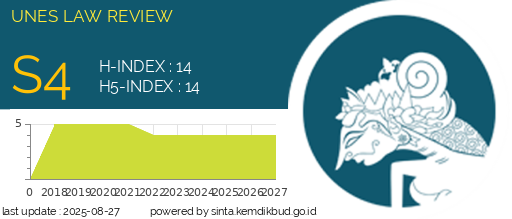Pengelolaan Tanah Wakaf untuk Usaha Produktif dalam Kesejahteraan Sosial oleh Nazhir Wakaf Menurut Undang-Undang No.41 Tahun 2004 Tentang Wakaf
DOI:
https://doi.org/10.31933/unesrev.v6i1.928Keywords:
Management,, Productive Waqf,, Nazhir.Abstract
Waqf is known as an asset of the people that can be utilized at all times. However, the productive management and development of waqf assets for social welfare has yet to be realized optimally. The enactment of Law No. 41 of 2004 concerning waqf has become a momentum to realize waqf productively. The waqf foundation Ar-Risalah and Persyarikatan Muhammadiyah which acts as nazhir waqf has the duty and responsibility to manage and develop waqf assets from wakif to productive ones. The research method used in this study uses empirical juridical research method. Based on research that productive waqf management implemented by the Ar-Risalah waqf foundation is by empowering plantations such as oil palm, banana and coconut plantations as well as renting shops, mini markets and renting waqf houses. Whereas the management of productive waqf by the Muhamadiyah Association is in the form of increasing the value of waqf assets by utilizing the functions of buildings such as the Muhammadiyah Taqwa Mosque and Muhamadiyah Dakwah Building which stand on waqf land to be developed into rental shops as a place to sell and use excess land to gain profits from renting parking spaces. The efforts of the Ar-Risalah Wakaf Foundation in developing waqf assets to become productive waqf for social welfare by managing waqf assets to be used as a source of income, one of which is by investing in the development of waqf land. Meanwhile, the efforts of Persyarikatan Muhamadiyah to form a cash waqf body as a form of management and development in a productive direction. The form of increasing social welfare carried out by nazhir waqf is by carrying out social empowerment, such as providing a place of business to be used as a place to open a business by the local community.
Downloads
References
Mukhtar Lutfi, 2012, Pemberdayaa Wakaf Produktif : Konsep Kebijakan dan Implementasi. Makassar: Alauddin University Press..
Depag RI, 2007, Panduan Pemberdayaan tanah Wakaf Produktif Strategis di Indonesia. Jakarta: Direktorat Pemberdayaan Wakaf Direktorat Jenderal Bimbingan Masyarakat Islam
Kencana, 2017, Hukuf Wakaf di Indonesia. Malang: Setara Press.
Ros Malasari dan Irvan Iswandi, 2021, Praktik Pengelolaan Wakaf Produktif Ditinjau dari Hukum Positif dan Hukum Islam (Studi Kasus di Yayasan Pundi Amal Bhakti Ummat Bekasi), Jurnal Sosial dan Budaya Syar-i, Vl.8 No.2.
Jaih Mubarok, 2008, Wakaf Produktif. Bandung: Simbiosa Rekatama Media.
Rachmadi Usman, 2013, Hukum Perwakafan di Indonesia. Jakarta:Sinar Grafika
Undang-Undang No.41 Tahun 2004 Tentang Wakaf
Peraturan Pemerintah No. 42 Tahun 2006 Tentang Pelaksanaan Undang-Undang Wakaf
Peraturan Badan Wakaf Indonesia No.01 Tahun 2020 Tentang Pedoman Pengelolaan dan Pengembangan Harta Benda Wakaf
Downloads
Published
How to Cite
Issue
Section
License
Hak cipta :
Penulis yang mempublikasikan manuskripnya di jurnal ini menyetujui ketentuan berikut:
- Hak cipta pada setiap artikel adalah milik penulis.
- Penulis mengakui bahwa UNES Law Review berhak menjadi yang pertama menerbitkan dengan lisensi Creative Commons Attribution 4.0 International (Attribution 4.0 International CC BY 4.0) .
- Penulis dapat mengirimkan artikel secara terpisah, mengatur distribusi non-eksklusif manuskrip yang telah diterbitkan dalam jurnal ini ke versi lain (misalnya, dikirim ke repositori institusi penulis, publikasi ke dalam buku, dll.), dengan mengakui bahwa manuskrip telah diterbitkan pertama kali di Jurnal UNES Law Review.



















